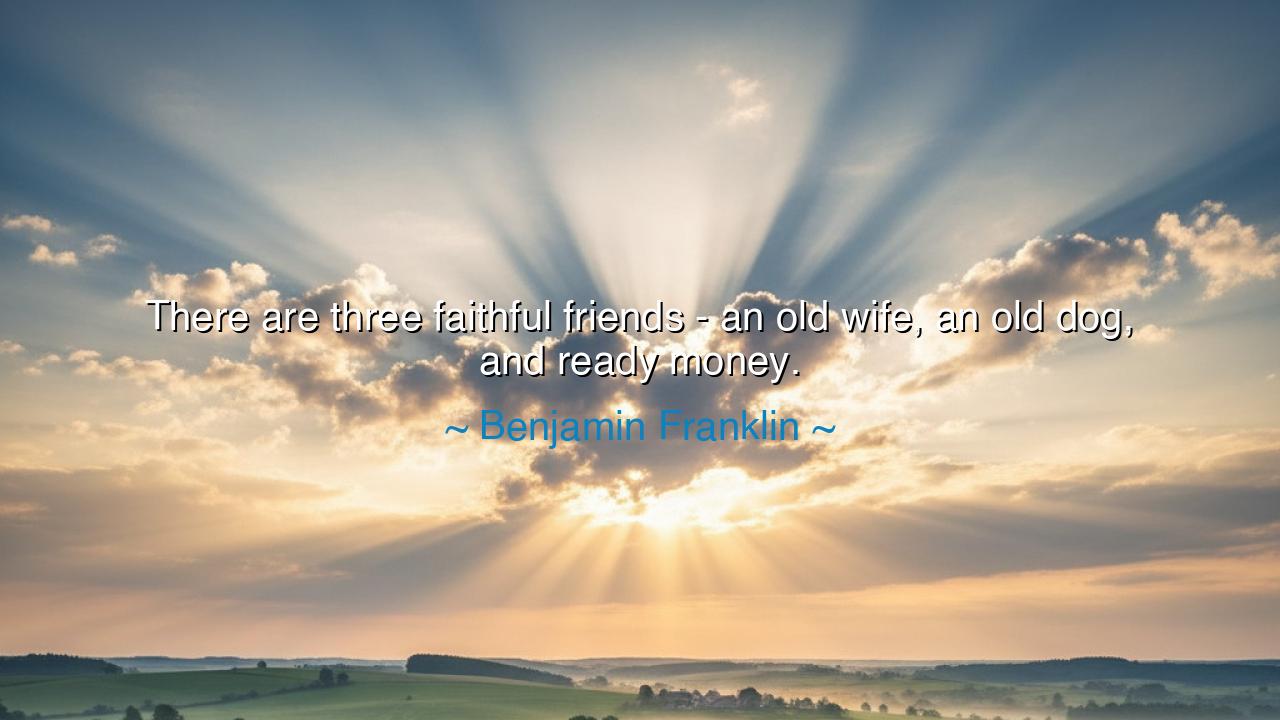
There are three faithful friends - an old wife, an old dog, and






"There are three faithful friends—an old wife, an old dog, and ready money." Thus declared Benjamin Franklin, sage of the New World, whose wit clothed wisdom in garments plain. His words may at first seem light, yet beneath them lies a sober truth: in this life of shifting fortunes, the heart must cling to what endures. True friends are rare, and these three—companionship, loyalty, and provision—stand like pillars against the storm.
The ancients also sought such constancy. Homer sang of Odysseus returning at last to his wife Penelope, who waited through years of trial, her faithfulness the anchor of his wandering soul. What armies could not give him, what kingdoms could not secure, he found in her steadfast love. Here lies Franklin’s wisdom: an old wife, bound not by beauty alone but by years of trust, is a fortress for the weary heart.
And what of the old dog? In every age, men have seen in the creature not only an animal, but a mirror of loyalty. A dog asks for little yet gives without end—protection, devotion, and joy in the simplest of moments. Kings may be betrayed by their courtiers, but a shepherd is never betrayed by his hound. The faith of a dog is untainted by ambition, and in this faithfulness it becomes one of life’s truest companions.
Yet Franklin, ever the practical sage, reminds us also of ready money. For in a world of hunger and need, goodwill alone cannot clothe the body or feed the poor. Money, when wisely kept, is a friend that answers when others fail. It grants independence, it secures freedom, and it shields against the cruelty of want. Though not noble in itself, it is a faithful servant when guided by virtue, and a safeguard against despair.
So let this teaching endure: treasure the friends that remain when fortune turns—an old wife whose love is proven, an old dog whose loyalty is sure, and ready money that shields against hunger’s hand. These are not lofty ideals but the bedrock of life, the companions that walk with man through both shadow and light. To neglect them is folly; to cherish them is wisdom that endures beyond kingdoms and crowns.






BOBui Oc
Part of me wants to push back on the implied hierarchy. Treating money as a “friend” feels risky; it’s a tool that can vanish, corrupt motives, or distort priorities. Are there more resilient anchors—skills, community ties, personal integrity—that outperform liquidity under stress? I’d appreciate a comparative lens: in disasters or downturns, which assets—social capital, health, craftsmanship, reputation—prove most protective? If we rebalanced this worldview, how might we invest time and attention so that security doesn’t depend so heavily on cash?
PNPhuong Nguyen
Read historically, the line reflects a world with fragile institutions and limited social safety nets. Longstanding domestic partnership and an animal’s constancy might have been literal bulwarks against uncertainty, while cash buffered crises. But the gendered phrasing and the transactional undertone need scrutiny. Could you offer context on 18th-century household economics, inheritance norms, and who held property or agency? I’m looking for a charitable yet critical reading that keeps the wit intact while addressing how modern ethics would reframe its assumptions.
TZTruc Zha
There’s a psychology question here about loyalty. Many of us trust familiar companions and routines because they’ve proven dependable, but does that bias blind us to growth or new alliances? How do we distinguish genuine, reciprocal steadfastness from mere predictability that keeps us comfortable? I’d love a framework: signals that a relationship is mutually invested, ways to test reliability without being manipulative, and practices for cultivating loyalty beyond sentiment—like shared commitments, transparent expectations, and repair rituals when trust inevitably frays.
KHNguyen Khanh Huyen
From a personal finance angle, the nod to liquidity seems prescient. In practice, how much cash reserve balances peace of mind with opportunity cost? For a middle-income household, would you suggest three to six months of expenses parked in high-yield accounts, or a tiered approach—immediate cash, short-term treasuries, then diversified investments? I’m curious how inflation, job stability, and dependents should shift the target. A practical, evidence-based rule of thumb (with a rebalancing cadence) would help operationalize this sentiment responsibly.
NDPham Thi Ngoc Diep
I’m torn between admiring the pithy realism and cringing at the value system it implies. Elevating a spouse, a pet, and liquid cash as the only truly reliable allies feels both comforting and a little cynical. Does this outlook foster gratitude for intimate bonds and prudent savings, or does it quietly reduce life to familiarity and solvency? I’d like a perspective on how to honor enduring relationships without implying that affection and loyalty are guaranteed—or that financial cushion is the ultimate litmus test for trust.